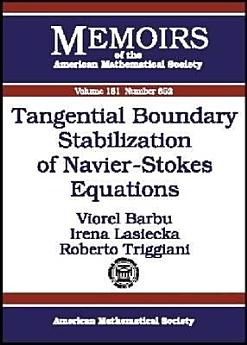Tangential Boundary Stabilization of Navier-Stokes Equations: Volume 181, Issue 852
Viorel Barbu · Irena Lasiecka · Roberto Triggiani
gen. del 2006 · American Mathematical Soc.
Llibre electrònic
128
Pàgines
reportNo es verifiquen les puntuacions ni les ressenyes Més informació
Sobre aquest llibre
The steady-state solutions to Navier-Stokes equations on a bounded domain $\Omega \subset Rd$, $d = 2,3$, are locally exponentially stabilizable by a boundary closed-loop feedback controller, acting tangentially on the boundary $\partial \Omega$, in the Dirichlet boundary conditions. The greatest challenge arises from a combination between the control as acting on the boundary and the dimensionality $d=3$. If $d=3$, the non-linearity imposes and dictates the requirement thatstabilization must occur in the space $(H{\tfrac{3 {2 +\epsilon (\Omega))3$, $\epsilon > 0$, a high topological level. A first implication thereof is that, due to compatibility conditions that now come into play, for $d=3$, the boundary feedback stabilizing controller must be infinite dimensional. Moreover,it generally acts on the entire boundary $\partial \Omega$. Instead, for $d=2$, where the topological level for stabilization is $(H{\tfrac{3 {2 -\epsilon (\Omega))2$, the boundary feedback stabilizing controller can be In order to inject dissipation as to force local exponential stabilization of the steady-state solutions, an Optimal Control Problem (OCP) with a quadratic cost functional over an infinite time-horizon is introduced for the linearized N-S equations. As a result, the sameRiccati-based, optimal boundary feedback controller which is obtained in the linearized OCP is then selected and implemented also on the full N-S system. For $d=3$, the OCP falls definitely outside the boundaries of established optimal control theory for parabolic systems with boundary controls, in that thecombined index of unboundedness--between the unboundedness of the boundary control operator and the unboundedness of the penalization or observation operator--is strictly larger than $\tfrac{3 {2 $, as expressed in terms of fractional powers of the free-dynamics operator. In contrast, established (and rich) optimal control theory [L-T.2] of boundary control parabolic problems and corresponding algebraic Riccati theory requires a
Puntua aquest llibre electrònic
Dona'ns la teva opinió.
Informació de lectura
Telèfons intel·ligents i tauletes
Instal·la l'aplicació Google Play Llibres per a Android i per a iPad i iPhone. Aquesta aplicació se sincronitza automàticament amb el compte i et permet llegir llibres en línia o sense connexió a qualsevol lloc.
Ordinadors portàtils i ordinadors de taula
Pots escoltar els audiollibres que has comprat a Google Play amb el navegador web de l'ordinador.
Lectors de llibres electrònics i altres dispositius
Per llegir en dispositius de tinta electrònica, com ara lectors de llibres electrònics Kobo, hauràs de baixar un fitxer i transferir-lo al dispositiu. Segueix les instruccions detallades del Centre d'ajuda per transferir els fitxers a lectors de llibres electrònics compatibles.




